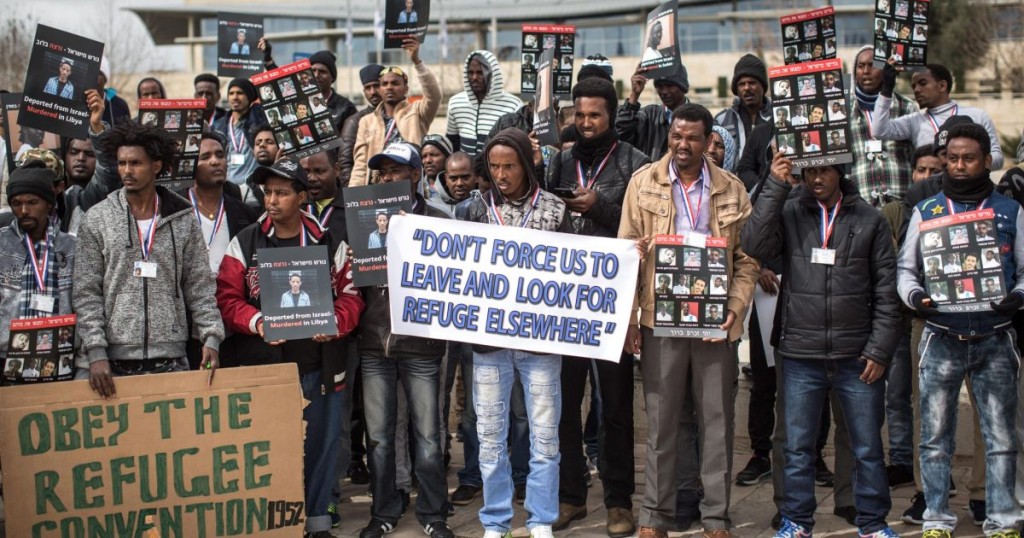And The One Who Does Not Want to Ask

I am putting aside the column I had originally intended for this month because I believe it is important to write about a dramatic development just unfolding: The Israeli government has just announced that it is not going through with what they have been planning for some time – to expel almost 40,000 refugees who have made their way from Africa to Israel in search of safety. Instead, about half the refugees will be permanently settled in Israel, while the other half will be absorbed by Western nations, including Canada, Germany and Italy. (See – Haaretz, April 4, Israel Reaches Deal with UN)
This decision is the product of years of activist demands on behalf of these innocent asylum seekers by such groups as the New Israel Fund, and T’ruah. These refugees have been in Israel for years, mostly struggling to get by, often doing the kind of lowly work that Israelis themselves do not want to do. They have been corralled into detention centers under terrible conditions or have congregated in poor neighborhoods, most especially in South Tel Aviv, contributing to the social problems that result from society’s ignoring inequality and poverty.

The brutal decision was to expel these unfortunate people and forcibly send them to some African countries where they were sure to face oppression, starvation and murder. These were people many of whom walked hundreds of miles through wilderness and desert (- sound familiar?) to escape war, famine, oppression and extermination. The evil decree was to take effect during this Passover season. This is the kind of timing that we associate historically with regimes that were bent on destroying the Jewish people! This time it was Israel that picked the time, a time when we are supposed to remember our own yearnings for freedom and safety. It is a holiday when we celebrate God’s liberating us from the House of Bondage, a decision that God testifies was motivated by God’s desire that we, ourselves, learn from the experience to treat the stranger and alien differently from Pharaoh. We are commanded to give to the alien equality, dignity and even love. (See, among so many treatments of this theme, the Torah Sparks for Parashat Bo for this year.) How horrible it was, therefore, to contemplate the sovereign Jewish government of Israel, a government that never ceases to emphasize its Jewish nature, pursuing a policy in utter contradiction to everything our tradition teaches us!
What made the Israeli government change its mind? It was the constant vocal pressure exerted by groups that would not stand silently by. From their first protests as lone voices, they kept speaking out until more and more Israelis and Jews around the world ( – including the Masorti/Conservative Jewish Movement) were convinced that they must oppose such injustice. Each of us should ask ourselves – did I join in these protests? Did I support this effort?
Those of us who did protest should take to heart this small victory on behalf of justice and compassion. Thousands of lives were saved. And this is one small salvation for the very soul of Israel. Protests work.
Those of us who did not take part in supporting this movement should examine the reasons why not. Perhaps it was because these efforts were spearheaded by groups that are regularly demonized and marginalized by the right-wing mainstream Jewish establishment. Many people are against criticizing Israel in any way, even when it means that thousands of innocent lives may be harmed or extinguished by our support for wrongheaded Israeli policies. So let it be said, loud and clear – it is these groups that refuse to stop holding Israel to a high standard of morality that have saved these lives. (And, by the way, the new arrangement that saves thousands of lives was made possible through the good offices of the United Nations, another demon in the imagination of many.)
Perhaps some of us did not support this campaign because we did not know about it. If that is the case we should ask ourselves – how we could be ignorant of this situation? The seder haggadah tells about four types of people – those who ask wisely, those who ask in order to attack and destroy, those who ask out of ignorance or confusion, and those who want to know, but who do not know how to formulate their questions. But the haggadah does not imagine that there might be another type of person – one who refuses to ask questions and who does not want to hear others ask questions.
Such a person is unimaginable for the haggadah because freedom assumes curiosity and critical thinking. Pharaoh lived in denial (- pun intended). Authoritarian regimes create societies where questioning is impossible. Silence is survival. But freedom is noisy. Freedom rejects the options of denial, ignorance and apathy.
One topic we discussed at our seder was the impact that the Exodus story has had over the centuries. What difference did the Exodus make? How was the world changed after the Exodus happened? Of course, without the Exodus the Jewish people would not be free. But the historical repercussions of our story have expanded beyond our experience, turning it into an inspiration for others – making civil disobedience to authoritarian oppression a real possibility, a real option for anyone in the world who has seen our example. After the Exodus story the notion of social protest and support for human dignity finally became a force in human history. The Exodus story changed the world. Before the Exodus the world did not know that people could dream to be free and strive to fulfill that dream. After the Exodus, denial, ignorance or apathy toward those dreams is morally and realistically impossible.
The protests of critics of the Israeli policy resulted in a small but meaningful victory. Change is possible. We can make a difference if we refuse to remain silent, if we reject the fear that tells us not to ask questions.
This month we are literally “after” the Exodus. We have celebrated our seders. At our tables we asked: How is this night different? Now, after the seder, we should ask: How has this night made a difference? What difference can we try to make?
—
An Update to this essay – Unfortunately, only hours after announcing the decision that I celebrate in this column, Prime Minister Netanyahu has suspended this agreement under pressure from him right-wing coalition partners. (See – Haaretz April 4, Netanyahu Nixes Deal)
I am profoundly saddened that the government has reneged on this decision. However, since there is no other viable solution possible, some have expressed hope that the policy will eventually be implemented. The need for raising our voices is as necessary as ever.
